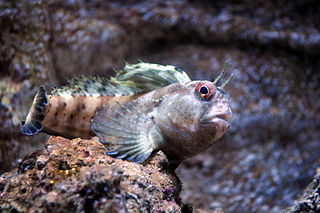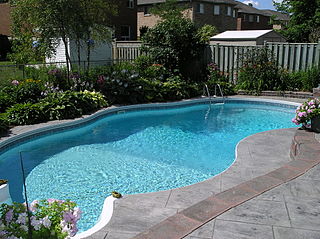
Combtooth blennies are blenniiformids; percomorph marine fish of the family Blenniidae, part of the order Blenniiformes. They are the largest family of blennies with around 401 known species in 58 generas. Combtooth blennies are found in tropical and subtropical waters in the Atlantic, Pacific and Indian Oceans; some species are also found in brackish and even freshwater environments.

Clinidae is a family of marine fish in the order Blenniiformes within the series Ovalentaria, part of the Percomorpha. Temperate blennies, the family ranges from the Atlantic, Pacific, and Indian Oceans, in both the Southern and Northern Hemispheres. The family contains about 86 species in 20 genera, the 60-cm-long giant kelpfish being the largest; most are far smaller.

Blenny is a common name many types of fish, including several families of percomorph marine, brackish, and some freshwater fish sharing similar morphology and behaviour. Six families are considered "true blennies", grouped under the order Blenniiformes; its members are referred to as blenniiformids. About 151 genera and nearly 900 species have been described within the order. The order was formerly classified as a suborder of the Perciformes but the 5th Edition of Fishes of the World divided the Perciformes into a number of new orders and the Blenniiformes were placed in the percomorph clade Ovalentaria alongside the such taxa as Cichliformes, Mugiliformes and Gobiesociformes.
Sabretooth or sabertooth may refer to:

Tide pools or rock pools are shallow pools of seawater that form on the rocky intertidal shore. Many of these pools exist as separate bodies of water only at low tide.

The tompot blenny is a species of combtooth blenny from the north eastern Atlantic Ocean which is found in shallow, coastal waters off western Europe, the Mediterranean and North Africa.

Vernal pools, also called vernal ponds or ephemeral pools, are seasonal pools of water that provide habitat for distinctive plants and animals. They are considered to be a distinctive type of wetland usually devoid of fish, and thus allow the safe development of natal amphibian and insect species unable to withstand competition or predation by fish. Certain tropical fish lineages have however adapted to this habitat specifically.

Sea Life at Mall of America is a public aquarium located in the Mall of America in Bloomington, Minnesota, United States. The 1.3 million-US-gallon aquarium contains thousands of aquatic creatures, including sea turtles, sharks, sawfish, stingrays, jellyfish and seahorses. There are eleven exhibits featured at the aquarium.

An anchialine pool or pond is a landlocked body of water with a subterranean connection to the ocean. Anchialine pools are a feature of coastal aquifers which are density stratified, with the water near the surface being fresh or brackish, and saline water intruding from the coast below at some depth. Depending on the site, it is sometimes possible to access the deeper saline water directly in the anchialine pool, or sometimes it may be accessible by cave diving.

Amphibious fish are fish that are able to leave water for extended periods of time. About 11 distantly related genera of fish are considered amphibious. This suggests that many fish genera independently evolved amphibious traits, a process known as convergent evolution. These fish use a range of terrestrial locomotory modes, such as lateral undulation, tripod-like walking, and jumping. Many of these locomotory modes incorporate multiple combinations of pectoral-, pelvic-, and tail-fin movement.

Bellapiscis lesleyae, the mottled twister, is a triplefin of the family Tripterygiidae, commonly found around the coast of New Zealand in rock pools and down to depths of about 5 m in reef areas of broken rock. Its length is up to 6 cm. The specific name of this blenny honours the New Zealand marine biologist Lesley Bolton who helped Hardy collect fishes in rockpools on the coast of New Zealand, including the type of this species.

A swimming pool, swimming bath, wading pool, paddling pool, or simply pool, is a structure designed to hold water to enable swimming or other leisure activities. Pools can be built into the ground or built above ground, and may be found as a feature aboard ocean-liners and cruise ships. In-ground pools are most commonly constructed from materials such as concrete, natural stone, metal, plastic, or fiberglass, and can be of a custom size and shape or built to a standardized size, the largest of which is the Olympic-size swimming pool.

Coastal fish, also called inshore fish or neritic fish, inhabit the sea between the shoreline and the edge of the continental shelf. Since the continental shelf is usually less than 200 metres (660 ft) deep, it follows that pelagic coastal fish are generally epipelagic fish, inhabiting the sunlit epipelagic zone. Coastal fish can be contrasted with oceanic fish or offshore fish, which inhabit the deep seas beyond the continental shelves.

Lipophrys pholis, commonly known as shanny, also known as the smooth blenny or common blenny, is a species of combtooth blenny. It matures at two years of age. Distributed in the Eastern Atlantic from the southern Norway to Morocco and Madeira, including the Mediterranean and the Balearics. Lipophrys pholis feed primarily on crustaceans, but also feed on other invertebrates and plants.

Montagu's blenny, also known as the capuchin blenny, is a species of combtooth blenny found in the intertidal zones of the eastern Atlantic ocean from England to Madeira and the Canary Islands as well the Mediterranean Sea, the Black Sea and the Sea of Marmara. This species prefers rocky shores with much wave action. This species grows to a length of 7.6 centimetres (3.0 in) SL. It is the only species in the genus Coryphoblennius.

Hypsoblennius is a genus of combtooth blennies found in the Pacific and Atlantic Oceans.
Hypsoblennius gilberti, the rockpool blenny, is a species of combtooth blenny found in the eastern Pacific ocean. This species grows to a length of 17 centimetres (6.7 in) TL. The specific name honours the American ichthyologist Charles H. Gilbert (1859-1928).

The rock-pool blenny is a species of combtooth blenny found in the eastern central Atlantic Ocean. This species reaches a length of 12 centimetres (4.7 in) SL.

The Portuguese blenny, also known as the red blenny, is a species of combtooth blenny found in the eastern Atlantic ocean off western Europe and Macaronesia.

Tigriopus brevicornis is a coastal marine copepod. They are a dominant member of shallow supra tidal rock pools along the North Western European coastline. A broad range of studies have been carried out on this species, including: its ecology, physiology, phylogeography, metapopulation genetics, development and reproductive behaviour. T. brevicornis has also recently been used in ecotoxicology studies and has been trialled as a live feed for larvae in several aquaculture-based studies for the past 30 years.

















